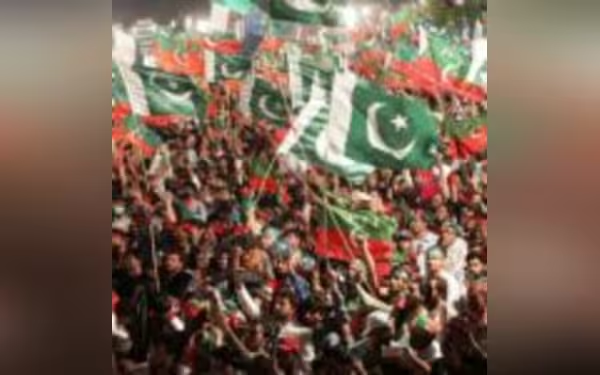Saturday, November 16, 2024 09:33 PM
PTI Announces Public Gatherings Without NOCs in Khyber Pakhtunkhwa
- PTI to hold gatherings without No Objection Certificates.
- Press freedom and democracy emphasized in CPNE meeting.
- Delayed advertisement payments to newspapers addressed.
 Image Credits: pakistantoday
Image Credits: pakistantodayPTI will hold public gatherings without NOCs, emphasizing press freedom and addressing delayed advertisement payments in Khyber Pakhtunkhwa.
PESHAWAR: In a significant announcement, Khyber Pakhtunkhwa Information Advisor Barrister Dr. Muhammad Ali Saif declared that the Pakistan Tehreek-e-Insaf (PTI) party will no longer wait for No Objection Certificates (NOCs) to hold public gatherings. This decision underscores the party's commitment to exercising its democratic rights, particularly the right to protest. Dr. Saif made these remarks during a meeting with the Council of Pakistan Newspaper Editors (CPNE), where he emphasized the importance of press freedom and democracy.
The CPNE meeting, chaired by President Irshad Ahmed Arif, addressed several pressing issues, including the concerning state of press freedom in Balochistan and the ongoing non-payment of government advertisements in Khyber Pakhtunkhwa. Dr. Saif reiterated the provincial government’s dedication to supporting press freedom, stating, "We support the freedom of the press and the struggle for democracy and the supremacy of the constitution." He acknowledged the challenges faced in obtaining NOCs for public gatherings, which have been a point of contention for the PTI.
One of the critical issues discussed was the delay in advertisement payments to newspapers in Khyber Pakhtunkhwa. Dr. Saif expressed regret over this persistent problem, attributing it to economic constraints and the provincial government's significant debt to the federal government, which is also indebted to the International Monetary Fund (IMF). He assured the attendees that Chief Minister Ali Amin Gandapur and the Information Secretary are actively working to resolve these payment issues.
Information Secretary Arshad Khan confirmed the formation of a committee to review and address the delayed payments. He explained that the involvement of defunct departments, such as the District Council, has complicated the situation. To expedite the resolution process, the Information Department has appointed a dedicated Recovery Director. Khan assured that claims from newspapers and journals would be processed swiftly if presented through the CPNE.
During the meeting, CPNE President Irshad Ahmed Arif condemned the attacks on press freedom in Balochistan and criticized the practice of withholding government advertisements as a means of coercion. He stated, "Threatening journalists or withholding government advertisements and payments as a form of coercion is an attack on press freedom." Arif urged both federal and provincial governments to refrain from intimidating journalists, warning that such actions undermine the constitutional right to freedom of the press.
The CPNE’s Standing Committee passed a resolution demanding the restoration of democratic values and press freedom in Balochistan. They called on the Khyber Pakhtunkhwa government to settle outstanding dues to newspapers and journals promptly. General Secretary Aijaz ul Haq mentioned a proposed meeting with the Chief Minister of Balochistan to discuss the deteriorating state of press freedom in the province.
Senior Vice President Anwar Sajidi shared his personal experience of receiving threats due to his fearless reporting in the "Daily Intikhab." Kazim Khan, another senior member, viewed such threats as a badge of honor for journalists, encouraging them to continue their courageous work. He stated, "Receiving threats is a matter of pride for journalists; we must continue our journey." Dr. Jabbar Khattak expressed concerns about the worsening state of press freedom in Balochistan, urging the CPNE to take serious action.
Amir Mahmood, Chairman of the Sindh Committee, provided updates on efforts to address press freedom issues in Sindh, while Ayaz Khan, President of the Punjab Committee, reported on a meeting with DGPR Punjab Dr. Faisal Shahenshah, who assured that pressing issues would be resolved. However, no progress has been made since his recent replacement.
The meeting highlighted the urgent need for the Khyber Pakhtunkhwa government to address the issues of delayed payments and the state of press freedom. The commitment to uphold democratic values and support for journalists is crucial for fostering a healthy media environment. As the situation evolves, it remains essential for all stakeholders to work collaboratively to ensure that press freedom is not only protected but also flourishes in Pakistan.













